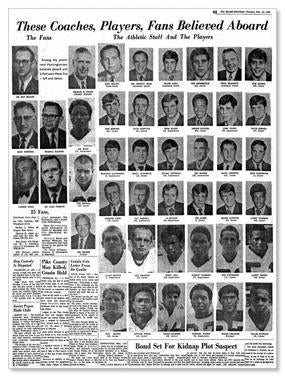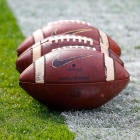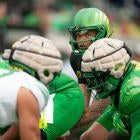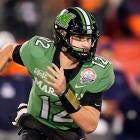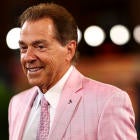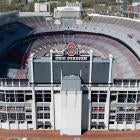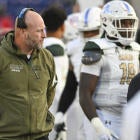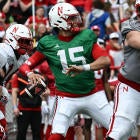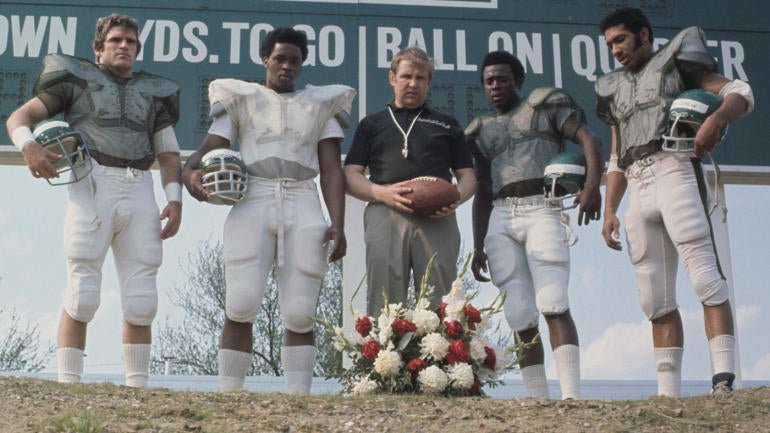
They met once a year, Red Dawson and the sycamore tree he picked out that was large enough to hide behind. From there, he could see them talk, cry, even reminisce about the largest air disaster in United States sports history.
He hid because they met once a year at the Spring Hill Cemetery memorial that honors the 75 souls who perished in the crash of the Marshall University football team plane 50 years ago this Saturday. He hid behind that sycamore each Nov. 14 for 20 years or so afterward because it hid him from the speeches, the families, the orphans, maybe his own remorse.
"Where nobody could see me," Dawson said of his hiding spot.
His life was spared that night a half century ago. Marshall's defensive coordinator did not return home with the team. He went recruiting.
"I could hear the speeches and see what was going on [from behind the tree]," he said. "I didn't want anybody to see me crying. That is certainly what was going to happen."
At age 78, there's a part of Dawson that questions whether fate is the lone reason he is not among those being memorialized rather than those observing it.
He's not the only one.
It's called survivor's guilt, the feeling of unfairly surviving an incident when others did not. It's categorized as a symptom of post-traumatic stress disorder (PTSD).
There's no evidence any of those left behind were ever formally diagnosed with survivor's guilt, but you can hear it directly or indirectly when the incident is spoken about.
"When the 14th of November comes around every year, all the worms and stuff start getting in your head," Dawson said.
That's the unseen damage left a half century later after a Southern Airways DC- 9 carrying the Thundering Herd back from a game at East Carolina crashed into a hill a mile short of the Tri-State Airport in Huntington, West Virginia.
The actual damage was incalculable. The late Jack Hardin, then a Huntington Herald-Dispatch reporter, once recalled stepping over a log on his way up the hill to cover the story. On the way down, he realized -- only by the light of a fire -- that the log was actually a body.
Former WSAZ-TV reporter Bob Brunner shared with CBS Sports, in disturbing detail, the sights and smells he experienced that night trudging up the hill and witnessing the wreckage.
"It made you wretch," Brunner said, "and I did several times."
It went beyond physical damage. Among the 75 who perished were 36 players. The rest were pilots, crew, coaches, administrators, boosters and business leaders. There were 64 children who became orphans after losing one or both parents on the flight.
The funerals went on for days.
"I'm sure you can pretty much figure that one out," said Mary Jane Tolley, wife of head coach Rick Tolley, who died in the crash. "It was horrible because it was a non-ending funeral. It was a funeral that never stopped. I couldn't go to all of them."
"This was a city, the largest in the state, that literally went into a four-day state of shock," Brunner said. "Nobody did anything. Nobody went anywhere."
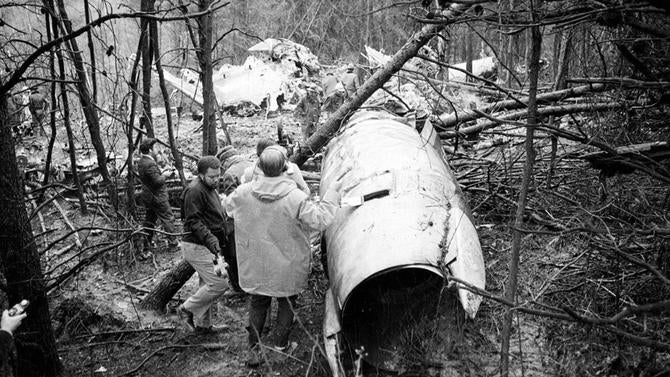
Something heals after 50 years
Dawson came out of the shadows long ago to embrace Nov. 14. He will speak at the annual memorial on Saturday like he has now for years.
"Lord, the first time they asked me to speak at the anniversary, I was a mess," Dawson said. "Couldn't keep the tears out of my eyes. Couldn't keep my voice straight. At that time, I thought I was a pretty bad-ass man."
It has been so long that the tragedy has been memorialized that Marshall athletic director Mike Hamrick has calculated that the date falls on a Saturday every seven years. He makes sure the Herd have a home game. On Saturday, it will be Middle Tennessee State.
Marshall is ranked No. 16 and undefeated at 6-0. Before the noon ET game, a crowd will gather at Spring Hill Cemetery once again to observe the past but also celebrate what they and the university have become.
A memorial fountain will be turned off the same time it is every year only to be turned back on in the spring. A sign of renewed life.
You see, out of the tragedy has come not a celebration but an annual realization that some good has been made out of the worst thing imaginable.
These are some of their stories, 50 years later.
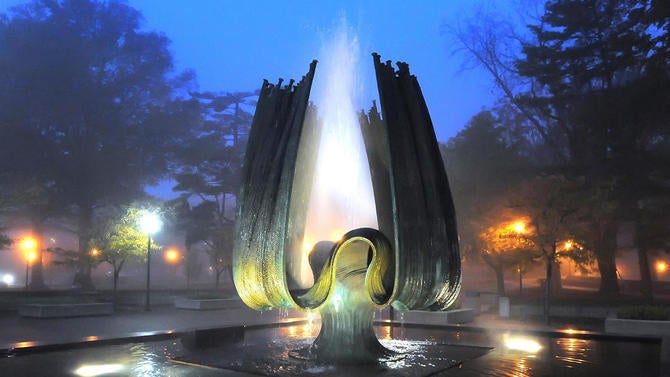
The cheerleader
Lucianne Call hasn't lost much of her cheerleading enthusiasm. She has made it her responsibility to track down pictures of all 75 victims for Saturday's memorial. Banners will be raised across the Marshall campus bearing their images. It has taken her more than a year.
She has all of them, including an image of offensive guard John "Jimo" Adams, whose daughter Patricia was born the day her father was buried. Patricia Smith was adopted and eventually, after exhaustive research, tracked down the identity of her father at age 30.
Call is giddy talking about Marshall president Jerome Gilbert's initiative to award all 36 players their diplomas at a Friday afternoon ceremony. Those were diplomas they never had a chance to receive.
Not surprisingly, Call will be the keynote speaker at Saturday's memorial.
Without an official designation, she has become the best historian of the events of 50 years ago. As a 21-year-old newlywed senior cheerleader at Marshall, she read the news of the crash on the crawl at the bottom of a television screen.
Suddenly, then-Lucianne Kautz was without a father. Charlie Kautz was Marshall's athletic director in 1970.
"This was the first time dad was so proud that we were going [to fly] first class," Call said. "We'd always rode buses."
The decision had already been made regarding cheerleaders for that trip. There was room for only a few of them on the plane to Kinston, North Carolina. (East Carolina is located nearby in Greenville.) Normally in that situation, the cheerleaders would draw straws to see who went.
This time, they decided if all couldn't go, none of them could go. They stayed in Marshall for a fundraising event.
Charlie Kautz had lived long enough to give away Lucianne at her wedding only five months earlier.
"For years, it was just a total devastating thing," Call said. "At 21, you haven't been familiar with death. He went to work one day and didn't come home."
That begins to describe some of that enduring guilt. There are so many stories of folks who either got a spot on the plane at the last minute or were bumped off. There were injured players who stayed behind. Pure chance, some cases.
Mary Jane Tolley didn't go because the local veterinarian recommended she stay because the couple's dog was sick. Middle guard Ed Carter was back in Wichita Falls, Texas, that terrible day to bury his father. Rick Tolley had helped him with the plane ticket to get back home.
In the days before instant news, the fog of tragedy took time to lift. Carter read his own obituary the next day in the local newspaper.
"The reason it's survivor's guilt is because so many people changed their mind at the last minute," Call said. "Shoulda, coulda, woulda."
In 2000, at age 50, Call became a flight attendant with USAir Express. Not only that, she happened to be on a flight during 9/11. Her flight made it safely back to that same Tri-State Airport the Marshall plane never reached.
When police needed a list of those on the plane, they came to the Kautzes' home. Charlie had given his wife a manifest before he left.
So why would anyone living with all that baggage intentionally go up in the air?
"I always loved to fly," she said. "God is your pilot. I had 75 angels there."
The preacher
Carter maintains he was spared because of God's providence. At age 69, the former Marshall defender calls himself a "traveling preacher." It's more than that, of course. He has traveled internationally and led huge congregations. Carter wants everyone to know God chose him to survive for that purpose.
Three-and-a-half years after the crash in 1974, Carter was working with Carl Hewlett, a former Marshall pitcher. Hewlett gave Carter a pamphlet titled, "Steps To Peace With God." Shortly thereafter, he surrendered his life to Christ.
"As I listened to the scriptures," Carter said, "the Lord has purpose for each one of our lives."
Carter can't recall how a Marshall assistant found his film in the late 1960s. Wichita Falls is 1,100 miles from Huntington. The college town agreed with him. Things were going swimmingly two weeks before the East Carolina game. Tolley gladly gave Carter time off -- even bought him the plane ticket -- to travel back to bury his father.
When it came time to return, Carter's mother Sarah urged him to stay at home. In fact, it was stronger than that. She feared for his safety.
"It was something the Lord gave her to tell me," Carter said. "It was not a premonition. It was an impression he put in her heart. To be honest, when she told me, I didn't believe her because we had never had a plane trip."
Mom and her intuition won. Without any particular reason, Carter stayed.
"I asked her many, many times [why she urged him to stay] before she passed," Carter said.
She never could explain it other than saying God had spoken to her.
"Oh sure, you ask yourself, 'Why did I miss it and all my friends and coaches were killed?' " Carter said. "In my case, it became clear four years later. The Lord watched over me so that he could save me and put me in the ministry to serve him."
After the crash, Carter took a bus back to West Virginia. The trip took 20 hours. He returned to find a city, a university and a program in despair. Carter hardly knew anyone on the team who carried on. Most of his teammates were gone, forever.
"The Young Herd" that carried on in 1971 had a new coach, Jack Lengyel. They even won a couple of games. The return became the subject of the film, "We Are Marshall".
God's providence? Two weeks before the release of the movie, Call was diagnosed with colon cancer. She went to the premiere in a wheelchair prior to her first chemotherapy treatment. On the 50th anniversary, they're both still around.
Carter will be thinking about "thanking the Lord for his grace and mercy, watching over me and sparing my life." But that begs the very human question of why God spared him and not those on the plane?
"God has a time for each one of us," Carter said. "Apparently, it was time God saw fit to call them."
The coach's gesture
In 2011, Frank Beamer directed the Virginia Tech team buses to detour on their way to Marshall's Joan C. Edwards Stadium. The Hokies were in town to play the Herd.
Virginia Tech's coach had a plan for the pregame.
Frank Loria was one of Beamer's best friends. The two played in the same defensive backfield for Virginia Tech in the late 1960s. Loria became Marshall's defensive backs coach in 1970. Beamer was at his wife-to-be's home that November night.
"I can remember the hurt in my stomach like it was yesterday," Beamer said.
Loria had been a two-time All-American at Virginia Tech. When he passed, Loria's wife was pregnant with Frank Loria Jr.
Beamer guided the buses to the memorial. He wanted them to learn about the Frank Loria he admired so much.
"He wasn't a real big guy, but I don't know how many ballcarriers he hit and knocked them back in the direction they came from," Beamer said. "Just a very smart guy. Football made sense to him."
That day nine years ago, "Frank Beamer became a very special person in my mind," Hamrick said.
Beamer had brought a special Hokie Stone inscribed with Loria's name. Hokie Stone is the native Virginia limestone that makes up many of the buildings on the Virginia Tech campus.
"He didn't tell anyone what he was going to do until the last minute," Hamrick said. "I got a call from our operations guy. He said, 'What the hell is going on with Virginia Tech?' They told the police they want to go to Spring Hill Cemetery. Frank got the whole team out and they went up and placed that Hokie Stone on the memorial."
"I just generally felt we lost a great Hokie that day," Beamer said. "He had a great future in front of him. He was taken away way too soon."
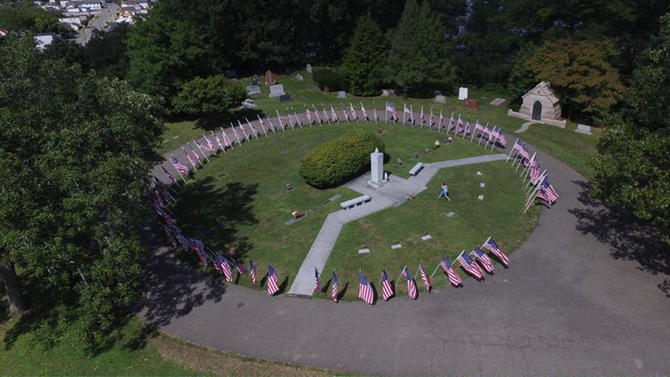
The coach's wife
The dog's name was Sturmisch. That's German for "stormy." Sturmisch lived to be 13. The Tolleys loved their German Shepherd. That's why, when a vet recommended Mary Jane stay home that weekend of Nov. 14 because a tumor had developed in Sturmisch's toe, there was no hesitation. She would just listen to the game on the radio.
"She was wonderful," Mary Jane Tolley said of Sturmisch. "We got her when she was 6 weeks old. We didn't have children, so she was like a child. After the plane crash, she became the only thing that I had."
Her recollections of the crash's aftermath are split. Of course, she misses her husband. They had met in Roanoke, Virginia, where she taught. Rick played football at nearby Virginia Tech. No one prepared her for what was next.
Authorities continually brought "old charred things" to her hoping to gain the identity of victims. Insurance agents were annoying. So were the religious types who were too numerous for their messages to get through. All except team chaplain Robert Scott.
"It wasn't losing faith," she said. "It was losing faith in these ministers. People would come to the house and say this was meant to happen. This is not what you wanted to hear. Fr. Scott would call up and say, 'Any time you want to call, you call me night or day. I'll be right over.' He never did try to preach to me. He was like a sounding board."
Mary Jane was the perfect coach's wife. Patient as an elementary school teacher but also unrelenting. She spoke of her husband's early days as an assistant at Ferrum Junior College in Virginia.
"It was just a little school in the hills," Mary Jane said. "All these guys, about 50 of them, came out for football. Rick, he ran them off. They couldn't take the tough routine. I told him, 'I'm afraid those guys are going to hate you because you're so hard on them.' "
Eventually, Rick won over their hearts and minds. Ferrum won the national junior college championship his first year there in 1965. After a year as Wake Forest's defensive line coach, Tolley was hired at Marshall in 1969.
"Straightforward, old time" is how Dawson described him.
They became friends and fished together. Largemouth bass were Tolley's favorite. The Tolleys were ingrained in the community.
Hamrick's future wife, Soletta, was in Mary Jane's sixth-grade home room back then. One day, the wife of the head coach was in class. The next day, Mary Jane was gone. There was no reason to be around. Her life had become unhinged. Mary Jane eventually moved to Richmond, Virginia.
About 10 years ago at a reunion, Mary Jane glanced across the room. Forty years from the time they had last seen each other -- the day before the crash -- the teacher saw the student and asked, "Soletta, is that you?"
"People still talk about that," Hamrick said.
Mary Jane was persistent. She traveled to Washington, D.C. for the hearings that were supposed to explain the crash. To this day, she isn't satisfied. The official cause for the crash was either altimeter malfunction or pilot error.
"That was the biggest farce you've ever seen," she said. "All of them were fighting and arguing over each other about whose fault it was. It was a rainy night. They couldn't see. The airport was not properly equipped. It was real big-time negligence.
"That's something I've never been able to get over because it was so wrong."
If her husband was too hard-nosed or too tough, those notions were dispelled in the days after her world was turned upside down. One day, she rounded a corner in her house. A bunch of her husband's former linemen were lining the walls of her living room.
"They were all crying, all these huge linemen," Mary Jane said. "They were just so wonderful. They did care a lot about him. They all had said great things about him. I realized I had been wrong about that."
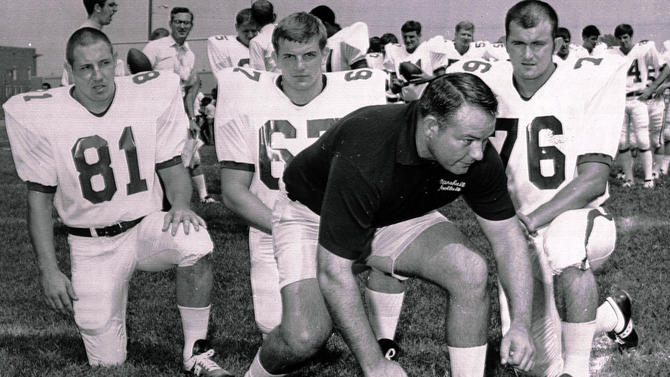
The coach
William Alfred "Red" Dawson was one of the best players Bobby Bowden ever saw. Dawson played tight end for Bill Peterson in the early 1960s at Florida State. Back then, Bowden was the wide receivers coach.
"We stayed friends forever," Dawson said proudly. "Bobby got this corona[virus] thing and beat it."
There is still a hint of that strapping tight end's body. But football quickly drained from him after the crash. In 1968, Dawson was hired by new Marshall coach Perry Moss as defensive coordinator. After an 0-9-1 season and investigation that ended with Marshall being kicked out of the MAC, Moss was gone. Dawson was retained by Tolley.
The decision had been made long before the East Carolina game that Dawson would be out recruiting after the game. Following a 17-14 loss, he was driving down with a graduate assistant to recruit a linebacker -- out of Ferrum of all places -- Billy Joe Mantooth.
The pair were listening to country music when the bulletin came across that a plane had crashed in Huntington.
"We knew which one it was," Dawson said.
They turned around, headed back home and immediately got lost. They arrived shortly before sunrise. What they witnessed was dystopian. Lives were shattered. Unprepared, Dawson was named acting coach.
"I was wondering when somebody is going to come up and say, 'You can't do that,' " Dawson said. "That had taken a toll on my football coaching, a lot of bad things. There was no playbook, and nobody had been in that position before."
When Lengyel was hired as Tolley's replacement, Dawson stayed but only for a while. The two didn't get along, according to Dawson. One of Dawson's greatest contributions may have been the recruiting of four African-American athletes out of Tuscaloosa, Alabama.
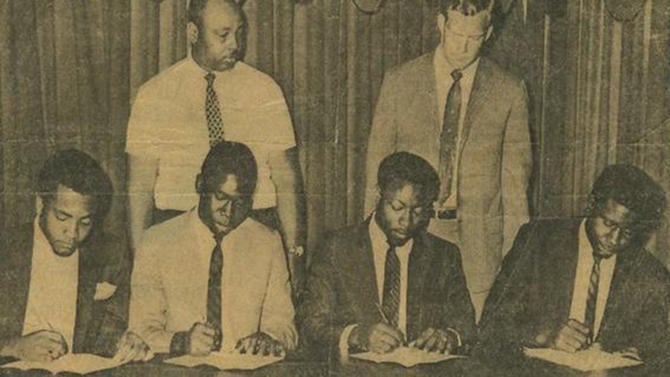
Joe Hood, Larry Sanders, Robert Van Horn and Freddy Wilson had come from Druid High School. Bear Bryant called Dawson, recommending them. That was the era before the color barrier had been broken in the SEC. Dawson's brother had been recruited by Bryant, so there was a relationship.
"The teammates liked the Tuscaloosa boys unbelievably," Dawson said, "especially when Reggie got there."
Reggie Oliver was an outgoing quarterback who eventually made his way into the Marshall hall of fame. But as a freshman in 1970, Oliver didn't travel. The Druid Four did and were all killed in the crash.
"For a long time, he couldn't handle it," Call said. "You have to realize he had to tell several, several players' families, all the ones that he recruited. That was an overwhelming responsibility."
Dawson eventually became a successful construction company owner. Football seeped out of his life. Red Dawson was admittedly bitter.
"I didn't do anything except for fishing, hunting and construction work," he said.
What about prayer?
"You couldn't count on it," Dawson said. "My wonder was, 'Why? What good is it going to do anybody?' "
That bitterness lingered. Two years ago, Oliver, the personable quarterback, leaned back in a chair. It slipped out from underneath him, according to Dawson, and Oliver hit his head. A week later, he died at age 66 as a result of the injury.
Two-and-a-half months ago, Dawson remarried. Marshall coach Doc Holliday invited him to speak to the team. Holliday wants to make a date to come out and hunt turkeys on Dawson's 400 acres outside of town. Sometimes Gilbert -- Marshall's president -- comes over for a couple of beers.
His football will didn't come back quickly, but something has changed over the years. Dawson goes to games again. There are gravesites at Spring Hill Cemetery bearing the remains of six Marshall players from the crash who could never be identified. Tolley's grave was moved up there a few years ago. There is already a plot there for one more.
"Red," Call said recently, "where you going to be buried?"
"I believe I want to be buried up there with my boys," Dawson said.
"The Lord has been good to me," he concluded. "I'm still wondering why."
Once again, on Saturday, Dawson will speak at the fountain ceremony. He and the sycamore have aged well.
Dawson hopes it goes as well as last year. During that ceremony, Gilbert spoke eloquently about the 75 souls again. Dawson noticed him wiping his eyes.
"You sissy," Dawson said. "You're not supposed to let people see you cry."
